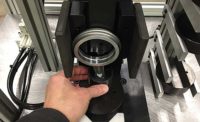
Benchmark Electronics Inc. (Angleton, TX) is an electronics contract manufacturer that provides telecommunication equipment, computer, industrial control equipment, test instrumentation and medical device services for a host of OEMs.
Among its products is a standard test platform called the "Target Tester," which performs a variety of board and device-level parametric testing and stimulus-response tests for electronics manufacturers.
According to Benchmark Electronics' Paul Schaffner, during the development phase, "We did not have specific requirements, just generalizations to deliver the best instrument capability with a low cost and small production footprint. The test solution had to be modular to accommodate quick component change-out times during calibration and repair cycles. We needed maintainable test application software to support the multiple custom applications our customers often provide to test products. In addition, we needed to deploy the test platform in numerous locations both inside and outside the United States."
To meet these needs, Benchmark Electronics engineers implemented NI TestStand software from National Instruments Corp. (Austin, TX) for test-flow control and National Instruments' LabVIEW software for low-level test code. The tester also incorporates a number of other National Instruments products, including a PXI-1044 general-purpose, 14-slot chassis; an MXI-4 interface connected to an industrial PC; a PXI-5124 150 megahertz digitizer; and PXI-6509 96-bit digital I/O.
"We had to strike a balance between desired capability and tester cost," Schaffner says. "At a minimum, the test solution had to provide basic parametric measurements as well as basic stimulus and response capability. Benchmark Electronics test developers selected instrumentation that met 70 percent of the product test requirements, which focused heavily on parametric testing. Other large-scale system integration testing was not within the scope of this type of test approach. We typically can meet the remaining 30 percent of our product test needs with instrumentation choices tailored to special product requirements."
According to Schaffner, Benchmark Electronics test developers adopted the standard NI TestStand interface with only minimal adaptation, which, in turn, facilitates easy version upgrades. One NI TestStand modification included a pull-down menu option to connect the tester to the Benchmark Electronics process-monitoring software called PFS, or Process Feedback System. When activated, PFS passes all test pass-fail statuses from NI TestStand to the monitoring system without operator intervention. Benchmark engineers also implemented an NI TestStand modification that facilitates simple maintenance and monitoring features for product-specific fixtures.
"We dubbed the test platform the "Target Tester" because we developed it to fit a test requirement niche Benchmark Electronics needed for low- to medium-complexity test solutions with a common look and feel across a variety of cultures within the company," says Schaffner. "The Target Tester standard platform approach is successful for Benchmark Electronics because it uses software and instrumentation standardization to the benefit of both test developers and production users. In addition, Benchmark Electronics customers realize a net savings by using available test capacity over the development of a wholly new test solution."
For more on electronics testing, call 979-849-6550 or visit www.bench.com.
For more on testing software, call 888-280-7645 or visit www.ni.com.


